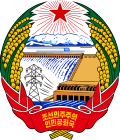Mauritania–North Korea relations
 From Wikipedia - Reading time: 6 min
From Wikipedia - Reading time: 6 min
 | |
Mauritania |
North Korea |
|---|---|
Mauritania–North Korea relations refers to the current and historical relationship between the Islamic Republic of Mauritania and the Democratic People's Republic of Korea (DPRK), commonly known as North Korea. Neither country maintains an embassy in their respective capitals.
History
[edit]Despite Mauritania's pro-French stance during the Cold War, the country maintained relatively close ties with the DPRK at times. Diplomatic relations were established on 11 November 1964, which caused South Korea to break off relations with Mauritania. On 4 November 1964, North Korea and Mauritania had issued a Joint Communiqué calling for the withdrawal of all foreign armed forces from Asia, Africa and Latin America, and endorsing the second Afro-Asian conference.[1]
In 1967, President Moktar Ould Daddah of Mauritania went on a state visit to Pyongyang.[2] In 1970, Kang Ryang-uk led an important delegation to Mauritania.[1]
On 30 May 1975, Kim Il Sung made a state visit to Mauritania.[3] This, jointly with a visit to neighboring Algeria during the same trip, was the sole occasion that the North Korean Leader visited a country outside of the East bloc and Asia.[1][4] During the trip, Kim Il Sung was awarded with the Grand National Order of Merit of Mauritania.[5] The visit is commemorated in the International Friendship Exhibition, which features a world map on which Mauritania and other countries visited by the country's Eternal President are lit up (in addition to a photo of Kim and President Ould Daddah).[6][7] The visit was also commemorated in a North Korean newsreel.[8][9] Almost immediately, in 1976, the reel was pulled from circulation because North Korea's relations with Mauritania soured after North Korea recognized the Sahrawi Arab Democratic Republic.[8]
Relations presumably remained strained during the late 1970s and early 1980s, due to North Korean aid to and military backing for the Polisario Front and the Sahrawi Arab Democratic Republic during the Western Sahara War.[10]
In June 1977, diplomatic relations between the two countries were broken off, and remained such for some time.[11][12]
See also
[edit]References
[edit]- ^ a b c Gills, Barry (2005). Korea versus Korea: A Case of Contested Legitimacy. London: Routledge. ISBN 113-476-625-4.
- ^ "NORTH KOREA: VISIT OF MAURITANIA PRESIDENT OULD DADDAH AND PARTY". British Pathé. Retrieved 2023-12-10.
- ^ "MAURETANIA : NORTH KOREAN PRESIDENT KIM IL SUNG ARRIVES FOR STATE VISIT". British Pathé. Retrieved 2023-12-10.
- ^ Hoare, James (2012). Historical Dictionary of Democratic People's Republic of Korea. Scarecrow Press. p. 137. ISBN 978-081-086-151-0.
- ^ President Kim Il Sung Met Foreign Heads of State and Prominent Figures 2004.
- ^ Cornell, Erik (2005). North Korea Under Communism: Report of an Envoy to Paradise. London: Routledge. p. 108. ISBN 113-578-822-7.
- ^ Sweeney, John (2013). North Korea Undercover. New York City: Random House. p. 56. ISBN 978-144-817-094-4.
- ^ a b Noland, Marcus (12 June 2011). "'The greatest event in the history of Mauritania'—Kim Il-sung's 1975 world tour". North Korea: Witness to Transformation. PIIE. Retrieved 10 March 2021.
- ^ See also President Kim Il Sung Met Foreign Heads of State and Prominent Figures 2004.
- ^ Becker, Jasper (2005). Rogue Regime : Kim Jong Il and the Looming Threat of North Korea. Oxford: Oxford University Press. p. 148. ISBN 019-803-810-0.
- ^ North Korea Newsletter. Naewoe Press. 1977. pp. 60–61.
- ^ Nahm, Andrew C. (1978). North Korea, Her Past, Reality, and Impression. Kalamazoo: Western Michigan University. p. 134.
 KSF
KSF
